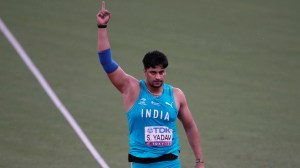In Goa school curriculum, lessons from ground on sanitation, waste management, traffic sense
Chairman of the Goa Education Development Corporation (GEDC), established under Goa Education Development Corporation Act, 2003, Kanta Patnekar said, “The review showed the need for these subjects. The response from students and teachers was encouraging.”
 In 2017-18, the pilot was conducted following a discussion between then Chief Minister Manohar Parrikar and educationists in the state.
In 2017-18, the pilot was conducted following a discussion between then Chief Minister Manohar Parrikar and educationists in the state.
A PILOT project from 2018 — training children on civic sense — will be integrated into the school curriculum this year in Goa. Of the core categories under civic sense, traffic is seen as a crucial “life saving” module, say experts with Goa Traffic Police who have been roped in to provide “educational feed” straight from their experiences.
Chairman of the Goa Education Development Corporation (GEDC), established under Goa Education Development Corporation Act, 2003, Kanta Patnekar said, “The review showed the need for these subjects. The response from students and teachers was encouraging.”
In 2017-18, the pilot was conducted following a discussion between then Chief Minister Manohar Parrikar and educationists in the state. Three subjects were introduced under umbrella topics: sanitation including personal sanitation, waste management, and traffic sense.
Goa, a tourist state with the local population facing the burden of floating tourists — through exceeding levels of garbage and also number of two-wheeler accidents, teachers say the subjects were “the need of the state”.
GEDC undertook 80 per cent of the research behind the project, as its inception mandate is to “develop competitive, flexible and value-based education system to meet the individual, institution and socio cultural development needs of the people of Goa”, says Patnekar.
The pilot was introduced in 108 schools as “separate subjects” in three different phases divided between primary and secondary schools. According to teachers, menstrual health was also a topic discussed in Goan schools for the first time under this sanitation module.
Once the topics were decided initially by academics and officials approved them, the next step was to look for experts in each field. Experts were roped in to create content in Goa and elsewhere. The content was then vetted by the State Council of Educational Research and Training.
According to a teacher, under the waste management module, children were taught the importance of segregation instead of burning waste — a practice otherwise prevalent in village pockets of Goa. “They were not just told, but informed through researched content by experts who work in those fields. Detailed literature was prepared, which included exercises for them to conduct back home,” an official with SCERT said.
“Three books were then published with detailed topics for three stages — first for Class III and Class IV students. The second stage was between Class V and Class VIII, and the final stage was for Classes VIII-IX,” said Patnekar. The coverage was limited to government schools. Before the subjects were introduced in schools, teachers from each taluka were trained by experts by giving them detailed examples from case studies in villages across Goa.
Traffic Deputy SP Dharmesh Angle who was roped in for the traffic module, said the training has already shown results. “While there are many reasons for lower fatalities this year, one reason is that children are walking back following the lessons they learn from these chapters on civic sense. Traffic sense is directly related to societal behaviour. These chapters were designed by the traffic department with the educationists and starts with the do’s and don’ts and with real life case studies,” said Angle. The traffic department now wants the SCERT and GEDC to include the importance of wearing helmets in the new curriculum with case studies and number of lives saved.
According to teachers, children have also started sensitising their parents on the lessons they learnt in school — an input which GEDC says helps.
GEDC is now in the process of finalising the content for the academic year 2020-2021. “We are now integrating the subjects in the curriculum, and all the learnings will now be part of existing subjects and will also be given as optional papers. Traffic sense will be part of Physical Education and the remaining two subjects will be part of the science and social science textbooks. These will include Goa case studies and will be implemented by the next academic cycle,” said Patnekar.
Photos



- 01
- 02
- 03
- 04
- 05




























